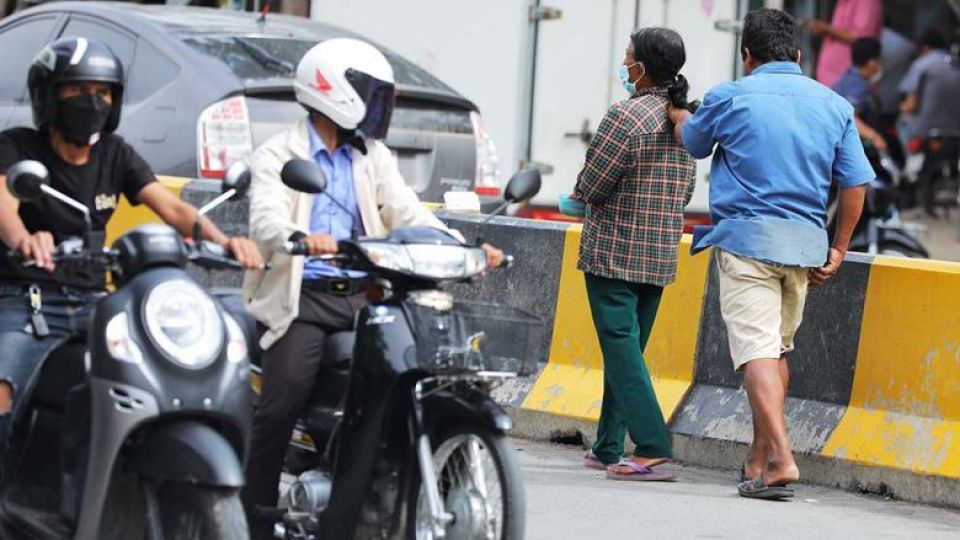October 14, 2022
PHNOM PENH – The busy streets of the capital have seen an increase of late in the number of people with disabilities singing at traffic intersections and other locations in order to earn donations from commuters and pedestrians.
Cambodian Music Association for the Disabled president Chea Huot, who is blind himself, said that the current situation for members of the association has worsened of late because there are fewer philanthropists hiring them to sing at restaurants or at other events and thus they are forced to perform on the street more frequently.
He said that the problem has affected their livelihoods and their health and despite receiving some support from the government it isn’t enough for them to get by each month.
“It is almost impossible to spend every morning singing, but we have no choice but to do so. Because of our disabilities we cannot get hired to do something other than singing and it is difficult,” Huot said.
He added that even today in modern Cambodia people with disabilities cannot travel on their own and have to rely on or hire someone else, whereas people with disabilities who live abroad in more developed countries are able to go anywhere on their own, in part because buildings and businesses have accessibility requirements they must meet and there are programmes to help with transport and other issues.
Ouk Solavi, a 51-year-old blind man, also said that since the Covid-19 pandemic, there were not many philanthropists who hired people with disabilities in the association to sing, and the association itself was self-established and funded without government or NGO support.
“Right now, if I go to the suburbs to sing, I cannot earn much, just enough to buy food,” Solavi said.
He said that some days he doesn’t even earn enough to eat because of the situation with inflation and the increase in the price of goods.
“This rainy season it was even harder to earn money so without the support of the government we wouldn’t be able to live,” he said.
Regarding this matter, city hall spokesman Meth Meas Pheakdey said that in the past the authorities had taken action to prevent disabled people from singing at traffic lights due to safety and other issues but with the current economic climate the practice might return.
“We already have actions implemented by the Department of Social Affairs, Veterans & Youth Rehabilitation so we will continue to monitor this and act if necessary,” he said.
Em Chanmakara, secretary general of the Disability Action Council, said that the reason for the increase in the number of people with disabilities singing at traffic lights was because they refused to accept the compromise offered by the social affairs ministry because they believe they earn more on the streets and it is their right.
“So, they think that it is better to make money on their own. We believe that this is not really a big problem. It is their livelihoods and they go and perform concerts at traffic lights to earn money to support their families and their association, so it is reasonable that they do so,” he said.
At the same time, he also stated that the ministry does not encourage people with disabilities to engage in the business of singing at traffic lights because there are many risks such as traffic accidents and health problems related to exposure to the heat and rain.
Chhor Bonnarath, Cambodia Disability Organization Program Officer, said that in general many of the traffic light singers are blind people because it is difficult in Cambodia for blind people to find any means to support themselves other than singing.
He said the department at the ministry used to have a designated place for them to sing, but it had too many people with disabilities needing to use it and it brought in very low income.
“If the government can provide better solutions for the blind in addition to singing such as providing them with suitable employment opportunities and training in skills they are able to perform that would help most of all,” he said.
Department of Welfare for the Disabled director San Ratana said that in the past the ministry has met with people with disabilities and explained to them the dangers of this practice and gotten them to sing elsewhere.
“We have a mechanism to help them, to provide a suitable place for them to sing and for them to stay, especially if they have an IDPoor card and receive a cash allowance every month,” said Ratana.
Phnom Penh authorities have set up three venues for people with disabilities to perform concerts at – Wat Botum, Wat Phnom and the former Freedom Park – but problems with a lack of passersby and crowding persist, according to Huot.


